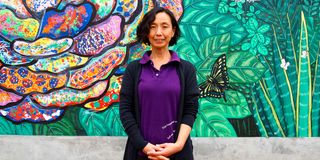Japanese doctor putting a smile on Kiambu mothers' faces

Founder of Garden of Siloam Kazuko Kumon during the unveiling of the organisation's mural at Tigoni ward on August 10, 2023.
What you need to know:
- Dr Kazuko first came to Kenya in 2002 to work with the Kenya Medical Research Institute (Kemri) as a capacity builder for medical professionals working with people living with.
- She later moved to Kibera, one of the largest informal settlements in Nairobi, to work in a small clinic in 2015; she currently operates in Limuru.
Most women with children with special needs shoulder the burden of caregiving on their own. However, for the past nine years in Limuru, Kiambu County, Dr Kazuko Kumon, a Japanese paediatrician, has dedicated her life to assisting such mothers at her facility.
Dr Kazuko first came to Kenya in 2002 to work with the Kenya Medical Research Institute (Kemri) as a capacity builder for medical professionals working with people living with.
She later moved to Kibera, one of the largest informal settlements in Nairobi, to work in a small clinic in 2015.
When asked why an accomplished doctor would move from Japan to Kenya, Dr Kazuko says her Christian values of serving others led her to leave her country and serve humanity by building the capacity of medical professionals in Kenya. She, however, notes that it was not until she worked in Kibera that she felt aligned with her purpose.
“I was very touched by the challenges most mothers I interacted with faced. Even though I was providing subsidised medical care to children with special needs, I found that medical care is a really small part of taking care of such children.
“Most of the families I met in Kibera had financial challenges and did not have medical insurance. There was also a lot of stigma and discrimination that made families collapse.
"Many parents would abandon their children and grandmothers had to take care of the children,” she says.
Motivation
She also learned that most of the children she interacted with were chased away from schools because they did not fit in conventional school environments. Her experience working at the clinic inspired her to start at The Garden of Siloam, an organisation providing day-care services, including therapy and education, for children with special needs.
Since 2015, Dr Kazuko has helped over 111 children. She now plans to admit about 50 annually. She takes them through therapy and education appropriate for children with special needs. Most children are recommended to the facility by local authorities and clinics.
“I have recruited occupational therapists; paediatricians; special need teachers, who run classes; and social workers, who work with the children. We do not offer boarding services because we want the community to interact with the children in their homes. This is to reduce the stigma surrounding children with special needs.”
Margaret Wambui, a 26-year-old single-mother, is one of the beneficiaries of Dr Kazuko’s services. Her child was diagnosed with cerebral palsy while he was two years old.
“I was employed on a flower farm where I would earn Sh7,500 a month. My child would get sick a lot and my employer did not understand that he needed special care, so I got fired. I used to take my child for therapy at Kiambu Hospital three times a week because he could not sit, yet he was two years old,” Ms Wambui says.
Ms Wambui says she was required to pay Sh250 for a therapy session, even though on some days there were no doctors to attend to her child.
“I was depressed because my nephew, who was born around the same time as my child, was very healthy, while my child was constantly sick. I stopped going for therapy for a while and only got wind of Dr Kakuzo through a friend when my son got very sick.”
Ms Wambui says her son started going to Dr Kakuzo’s facility, he has significantly improved and can now sit and stand on his own. “They catered to both of us. I was counselled and informed that my child had cerebral palsy and his development would be slower than other children’s. I also learned that as a mother of a special needs child, I can also be happy.”
Although Dr Kazuko has been serving children with special needs for almost a decade, she says taking care of persons living with disabilities should be taken seriously by the government.
“Children with special needs are a social responsibility. They cannot sustain themselves without the support of the government and community.
"There should be similar services offered in other parts of the country, including employment opportunities for such children once they are trained in a skill,” Dr Kazuko says.





